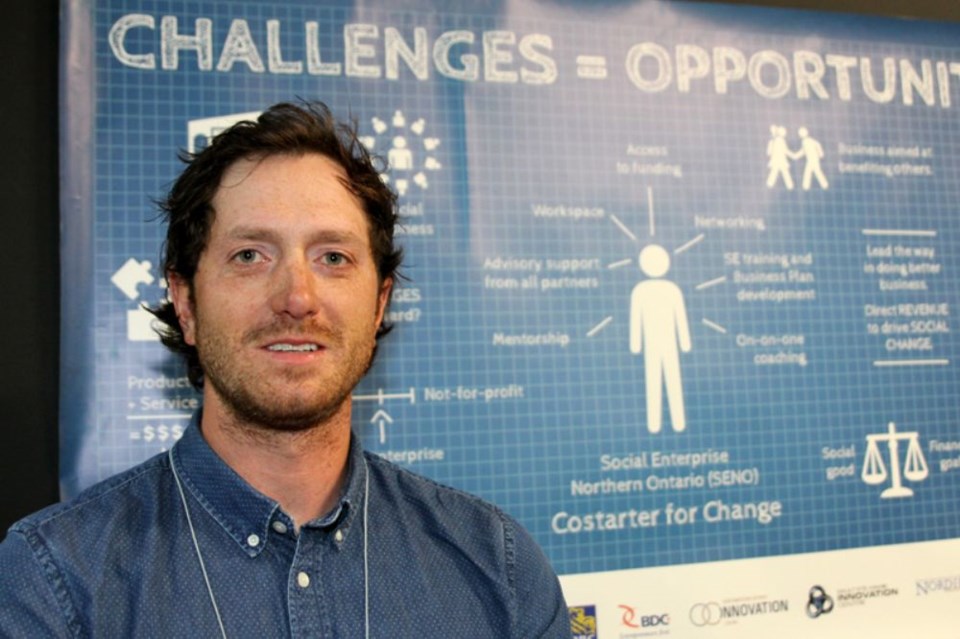Local commercial fishing could be an at-risk species in Thunder Bay.
The business owners who operate the fishing vessels that troll the Lake Superior coast have traditionally had their children take over upon retirement. With less youth interested in running those family businesses, the generational model now has an uncertain future.
Understanding the problem, Paul Drombolis and Tony Chiodo came up with a possible solution that might just allow the remaining commercial fishermen to keep their nets in the water.
Eat the Fish is the business Drombolis and Chiodo created. Nearly ready to begin operations, Eat the Fish will help supply the city with wild and local fish and allow the people who catch the fish to focus on just that.
“It’s challenging for the fishermen to get their fish to the market,” Drombolis said.
“There’s no one really there to bridge the gap between the fishermen and the customers. They’re out there working hard every day of the season to catch their quota and we want to ensure that the local community is able to access that fish.”
Once they begin operations, Eat the Fish will process and bring the ready-for-sale fish to the Thunder Bay Country Market where customers can have a direct link to the product.
Right now fishing is a wholesale industry. The fishermen sell their product to single large buyers, which don’t exist in this city.
“That creates a challenge,” Drombolis added. “The local community doesn’t have the ability to access the fish.”
Eat the Fish not only gives local customers a chance to purchase the local catch, but purchasing in smaller quantities gives the fishermen a better per-pound price than they’d receive from the wholesalers.
Drombolis discussed his business model Wednesday during a Paro Centre media event that celebrated the organization’s Social Enterprise for Northern Ontario (SENO) CoStarter for Change program.
Considered a social enterprise, Eat the Fish was one of seven businesses accepted from the program’s second round of applications.
The SENO program began as a pilot project in June 2015. The first two rounds of applications accepted 13 applicants out of a potential 44. On Wednesday PARO announced that it is now accepting a third round of applications, an opportunity that will remain until July 29.
Businesses accepted into the SENO program face unique challenges, said SENO program manager Aleksa Shermack.
“A social entrepreneur is someone who is in business bus also socially minded,” said Shermack. “They’re business has a double or triple bottom line. They’re working on solving a social issue … but just like any other business you want to keep the lights on, pay your staff and you want to be able to pay yourself.
Being committed to fulfilling the social aspect of the business means that often the business owners are sacrificing profits for a greater cause.
Successful SENO applicants are brought into a 12-week incubation period and accelerator program. Workshops, mentoring and other kinds of supports are offered by Paro and SENO program partners to help the applicants move forward to achieving their business goals.
“We have a huge network of people here to help these people and their businesses,” Shermack said.
Businesses accepted in the second round of SENO program applications include:
• Leslie Boote - Mother Nurture (Thunder Bay)
• Lorri Kilborn – A Fresh Start (Thunder Bay)
• Tamara DeGagne – Atikokan’s Finest Youth Employment Initiative (Atikokan)
• Paul Drombolis & Tony Chiodo – Eat the Fish (Thunder Bay)
• Kyle Jewett – Sault Skate Part Co-Op (Sault Ste. Marie)
• Sandra Hodge – Great Lakes Basin & Splash Tile (Sault Ste. Marie)
• Morgan Richter & Kelli Ebbs – Muskoka North Good Food Co-Op: In Season (Huntsville)
Social entrepreneurs interested in applying can find out more information online here or call 807-625-0328.
